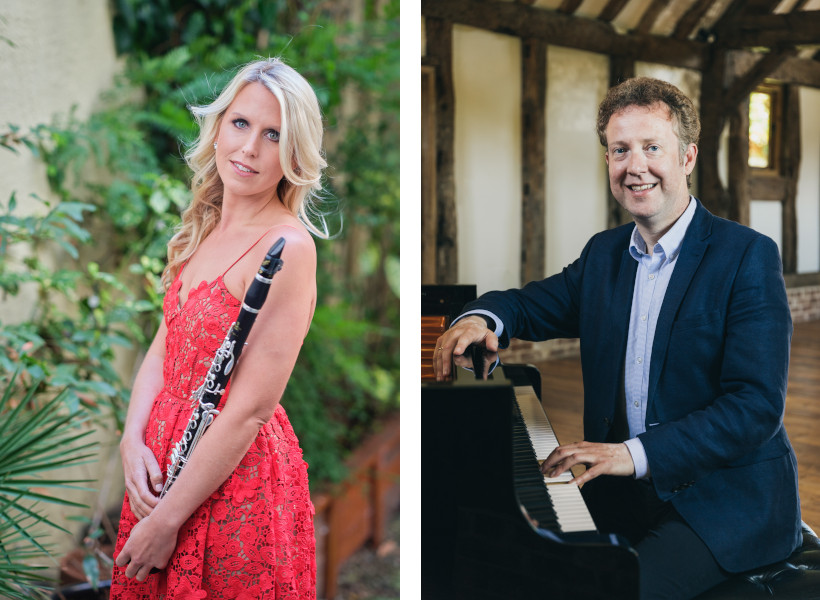
Sarah Williamson (Clarinet)
Sam Haywood (Piano)
Virtuoso clarinettist Sarah Williamson first came to public attention as a division winner and finalist in the BBC Young Musician Competition 2002. Since then, she has performed as a soloist in many of the world’s major concert halls (the Albert Hall, the Berlin Konzerthaus, the Carnegie Hall…and so on through the alphabet to Zurich’s Tonhalle). She has toured extensively with UK orchestras such as The Academy of St Martins in the Fields, the City of London Sinfonia and the Royal Philharmonic. And she is widely recognised as a leading interpreter of the contemporary clarinet repertoire, including commissioning new works for premiering at the Wigmore Hall. BBC Music Magazine has said of her, “A tenacious player like Williamson doesn’t need gimmicks – her sonorous timbre and natural musicality speak for themselves”, while The Telegraph has described her technique as “a blend of languor and exuberance”.
For this concert, she teams up with internationally acclaimed pianist and composer, Sam Haywood, whose work as both a soloist and chamber musician has taken him across the globe. The New York Times has praised his “passionate flair and sparkling clarity” and the Washington Post, his "dazzling, evocative playing”. He has also recorded albums for a number of notable labels, including Sony Classical and Hyperion Records, and he had the great privilege of making the first ever recording on Frédéric Chopin's own piano, to celebrate the composer’s bicentenary in 2010. Sadly, we can’t recreate those circumstance for him at St Briavels but we do draw your attention to Item 3 on the programme…
Finzi: Five Bagatelles
Poulenc: Sonata
Chopin: Barcarolle Op 60 (Solo piano)
Messager: Solo de concours
John Ireland: Fantasy sonata
Brahms: E Flat sonata
Gershwin: 3 preludes arranged for clarinet and piano
It can often be the fate of the accompanist to feature in programmes only in tiny font, preceded by that dread preposition with…
Not so, for Sam Haywood. In their playing partnership, he and Sarah Williamson meet as equals and the music the pair have chosen reflects this. Indeed, John Ireland’s Fantasy-Sonata (1943) contains a truly virtuosic piano part. One contemporary critic wrote of the piece “in all English music of the last half-century there has been no purer pianoforte writing than this”.
Also sneaking into the programme of our concert this coming Sunday, we have a composition for solo piano: the Barcarolle in F sharp minor, Op. 60 by Frédéric Chopin (1846), described by Haywood as “one of my favourite Chopin works. It is endlessly inventive, harmonically daring, reflective and also highly dramatic.” The term barcarolle refers to the folk songs sung by Venetian gondoliers (una barca meaning boat in Italian) and the rhythm is said to mirror the oarsman’s distinctive push-pull stroke. “I can’t imagine a life without Chopin’s music”, writes Haywood; “I have always loved playing it”. The perfect guide to this most demanding of works? Quite probably.